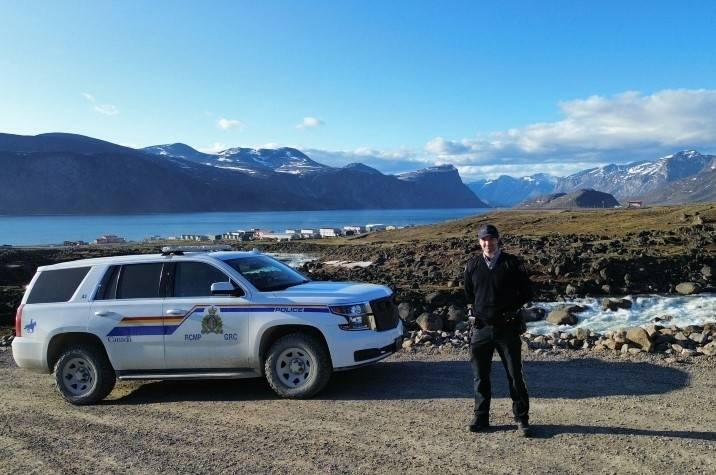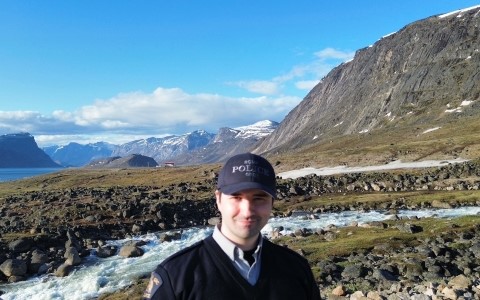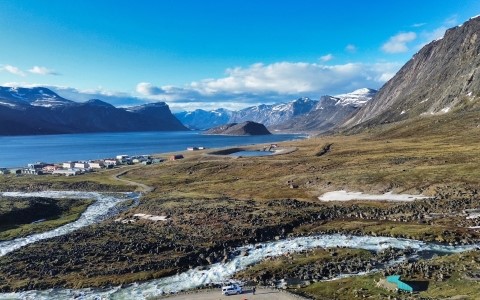New Constable discovers opportunity and growth in Nunavut
By Mara Shaw

Small Arctic detachment demonstrates policing beyond the badge.
Image by RCMP
August 10, 2025
Content
In the remote northern community of Pangnirtung, Nunavut, RCMP Constable Adam O'Reilly's daily routine sometimes looks a little different from what most people imagine when they think of policing. Yes, there's patrolling, paperwork, and on-call duties. But there's also soccer games with local kids, tea with Elders, and lessons in the Inuktitut language. These are all part of a commitment to building trust and relationships in the North.
Originally from Nova Scotia, O'Reilly spent a decade working as a bartender before joining the RCMP. He was drawn to policing by a desire to make a tangible difference – a calling that's been realized in the tight-knit community he now serves. He received his badge in June 2023, and this small Arctic community became his first posting.
"Driving around I feel like what the Queen must feel like. My hand gets tired from waving at people," says O'Reilly. "The kids are not shy at all; everyone is very welcoming."

Trust in action
In Pangnirtung, community engagement isn't a bonus; it's a crucial element of effective policing. Working alongside detachment commander, Sergeant Scott Kirychuk, in the 1,481-person community O'Reilly is known simply as "Atamie, the police officer" – Atamie being the Inuktitut form of Adam, one of the Indigenous mother languages of the Territory – a figure of both authority and approachability. To some, kicking a soccer ball around with school kids may not seem like important work, but these efforts aren't just goodwill, they're key to building trust.
"I really enjoy being able to be a source of trust," says O'Reilly. "Sometimes people come up and chat about their day-to-day lives. It's nice to know that people can come to us for help with whatever they need."
But building that trust doesn't happen overnight. One of O'Reilly's key priorities has been to learn about the community's culture and traditions. He's connected with Elders over tea, listening to their stories about the land, and takes weekly language lessons. While he admits he's far from fluent, the effort to speak even a few words of Inuktitut helps bridge cultural gaps.
These intentional relationships have real-world benefits. O'Reilly recalls one particularly challenging situation when an elder passed away while whale-hunting. Without a police boat, the detachment leaned on the strong ties they've built within the community, borrowing a local's boat to retrieve the man's body.
"If we didn't have a relationship with the community, we would have to make some calls to get help," he says. "But with these relationships we can use what we have available to get the job done as quickly and efficiently as possible."

Resilience and growth
Still, northern policing comes with its share of challenges. Power outages, resource shortages, and isolation are part of daily life. The detachment currently has just two officers, with a few more expected to join in the fall. "It's not easy," says O'Reilly, admitting that he relies heavily on technology to stay connected to his network back in Nova Scotia. "We're isolated from friends and family back home."
Maintaining his own health – mental and physical – is key to managing the demands. O'Reilly keeps in close contact with friends and family, prioritizes regular workouts at the detachment gym, and checks in with a psychologist coordinated by mental health supports, to stay grounded. "I feel like we have the supports that we need," he says.
Taking everything into account, he appreciates the opportunity to grow and learn. "It's a bit of a double-edged sword," says O'Reilly. "We don't have the resources of detachments in the South, but it's been a good learning experience being able to handle files that might get passed onto a different unit in a big city. We handle everything ourselves."
For those considering a northern posting, O'Reilly offers honest advice acknowledging the challenges while recognizing the opportunities to develop career-wise, grow culturally and revel in the natural beauty of the region. "It's almost like living on another planet, with how spectacular it can be," he marvels.
O'Reilly's story isn't just about policing. It's about how small connections – a shared laugh with a child over soccer or a meaningful conversation with an elder during a game of checkers – build the kind of trust that keeps communities close. In Pangnirtung, those connections matter as much as the badge.
